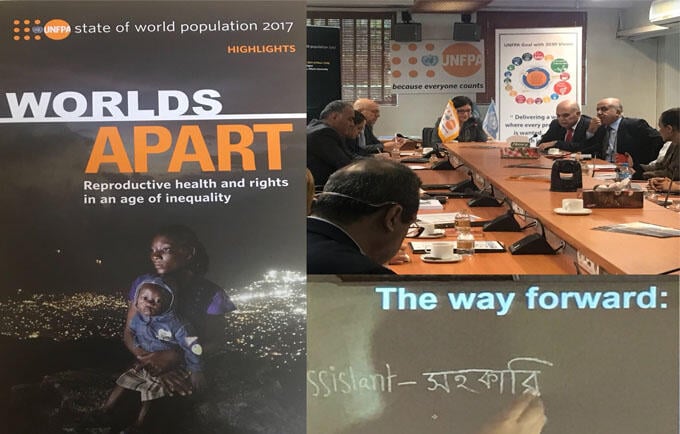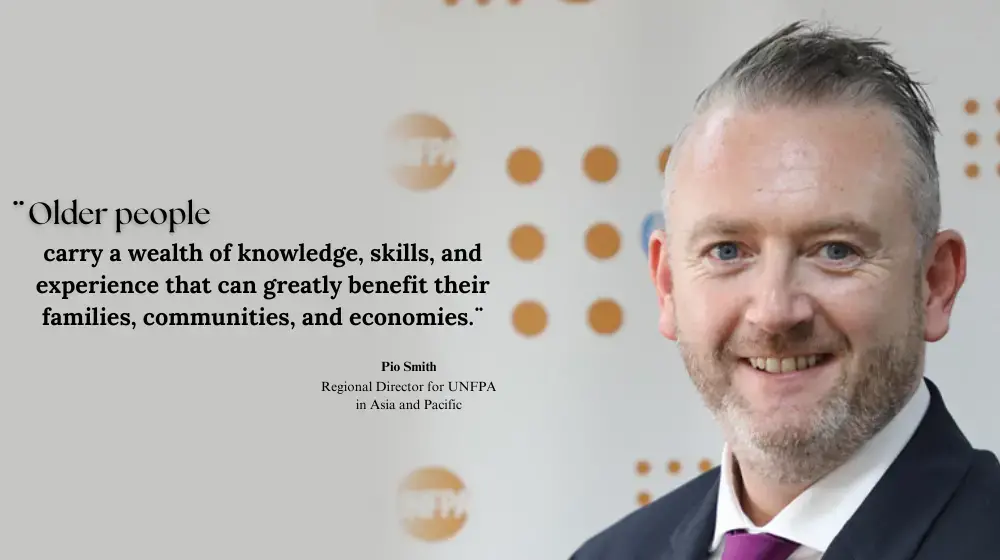A technical briefing session was hosted for the donors and the international community on the 2017 State of World Population (SWOP) Report. The global launch of this United Nations Population Fund (UNFPA) flagship report, entitled “Worlds Apart: Reproductive Health and Rights in an Age of Inequality” coincided this year with the international day for eradication of poverty.
Ambassadors and representatives from a large number of embassies and international organizations including UN agencies participated in the session on Thursday 23 November 2017. Dr. Leila Joudane, UNFPA Representative in her welcome speech elaborated that the report aims to reflect on how sexual and reproductive health and rights may contribute to a fairer, more inclusive society, where everyone’s rights are respected. She quoted, Dr. Natalia Kanem, Executive Director of UNFPA “our world is increasingly unequal, but this inequality is not only about money, it’ also about power, rights and opportunities’’ and underlined that if a woman or adolescent girl cannot enjoy her reproductive health and rights, then she cannot stay healthy, cannot complete her education, cannot find decent work, and cannot chart her own economic future to ultimately contribute to her society.
Dr. Joudane lauded Iran’s significant achievements in the health and education sectors and noted that efforts should continue to be made to sustain these achievements while addressing any disparities and inequalities. She elaborated on the current demographic profile – window of opportunity – positioning Iran with the largest number of young people for the next decade which is an asset for the country. To fully benefit from this demographic window of opportunity, a life course continuum approach should be adopted to provide the youth and adolescent with the required knowledge and skills to remain in good health, to ensure healthy families, so that their effective participation in labor force is guaranteed and stable peaceful society ensured.
The global SWOP report was presented to the audience by Dr. Monire-Therese Bassir, UNFPA Programme Specialist and Dr. Kambiz Kabiri, UNFPA Programme Analyst. The report argued that while economic inequality may be improving between countries, it is worsening within many countries. In at least thirty-four (34) countries, gaps between the richest and poorest grew between 2008 and 2013. In many countries, a privileged few are rising to the top and are staying there, while the ranks of those at the bottom grow. Inequalities in reproductive health are linked to economic inequality. Within most developing countries, women in the poorest 20 per cent of the population have, for example, the least access to sexual and reproductive health services, including contraception, while, women at the top of the wealth scale generally have access to a fuller range of high-quality services.
Following the presentation of the SWOP report, a thought-provoking discussion was held on the issues addressed in the report. Among which issues of boys having to leave the school to take part in workforce, discrepancy between men and women in labor force, availability and access on primary health care coverage can be highlighted. In addition possible areas of South-South and North-South collaboration with Iran was discussed.
Dr. Joudane concluded the session by thanking the distinguished participants for attending the session and emphasizing on the fact that stopping the present downward spiral of inequality globally requires a new vision, a vision for inclusive societies, where all human potential is realized. She added that this has been envisaged in the UNFPA Strategic Plan (2018-2021) and reiterated on UNFPA’s commitment to work with host governments, partners, donors and other United Nations agencies towards a future where no one is left behind, and where zero is the only acceptable number:
Zero maternal deaths,
Zero unintended pregnancies
and Zero gender-based violence and harmful practices.




